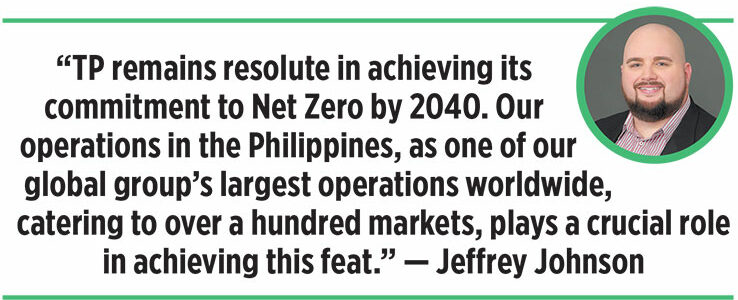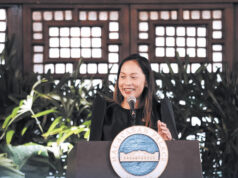Taking initiative for a sustainable planet

By Angela Kiara S. Brillantes, Special Features and Content Writer
As the planet faces the harsh realities of climate change, climate action needs to further accelerate. According to the World Meteorological Organization (WMO), 2024 was marked as the hottest year in history, with extreme temperatures on land and ocean, as well as rising sea levels and greenhouse gas levels.
Recognizing the urgency of the climate crisis, global chief executive officers (CEOs) are increasingly driven by the need to reinvent their companies in response to climate change. To ensure long-term success, business leaders are transitioning toward net zero emissions and investing in climate-friendly technologies.
In a PwC report, about 33% of global CEOs anticipate that climate change will significantly influence how their companies operate over the next three years. This is echoed by another study, which showed that 37% of employees expect their jobs to be affected by climate change within the same time frame.
Since then, companies have been taking charge of managing climate impacts. Many have seen tangible benefits from their climate-friendly investments and sustainable initiatives, among them higher revenue from their climate investments over the past five years.
Within the country’s real estate sector, Filinvest REIT Corp. (FILRT), the country’s first sustainability-focused real estate investment trust company, has taken significant initiatives in climate action, exemplifying the power of clean and sustainable energy in business operations.
Established in 2015, FILRT is setting an example in the sustainable real estate movement by utilizing cleaner and more energy-efficient power across its buildings.
 “FILRT recognized early on that efficiency and environmental responsibility are closely linked. This understanding shaped its approach, integrating sustainability into its strategy and property portfolio,” FILRT President Maricel Brion-Lirio told BusinessWorld in an email.
“FILRT recognized early on that efficiency and environmental responsibility are closely linked. This understanding shaped its approach, integrating sustainability into its strategy and property portfolio,” FILRT President Maricel Brion-Lirio told BusinessWorld in an email.
With sustainability having been a key driver of its growth in recent years, FILRT has enhanced its operational efficiency and dramatically reduced utility consumption through clean, energy-efficient solutions.
“FILRT contributes to sustainable development by integrating energy-efficient solutions and clean technologies across its properties, reducing environmental impact and supporting climate change mitigation,” Ms. Brion-Lirio added.
For instance, its Axis Tower One and Vector Three, 25- and 22-storey office buildings, respectively, are designed with sustainable features, including energy recover ventilators (ERVs), low consumption lighting and plumbing fixtures, and strategic building orientation. Both buildings are among the country’s LEED (Leadership in Energy and Environmental Design) Gold-certified developments.
Another remarkable example is the District Cooling System (DCS), which is designed to reduce electricity consumption by 40%. The cooling system produces and distributes cooling energy, primarily chilled water, through a network of underground pipes, reaching various buildings within a district.
In the Northgate Cyberzone, a hub for technology-based businesses in Filinvest City in Alabang, 81% of FILRT’s buildings utilize the DCS, making it the first and largest cooling system in the country. It provides various benefits such as reduced greenhouse gas emissions, improved energy efficiency, and enhanced cost-effectiveness. Its focus on clean and sustainable energy has perfectly aligned with global sustainability standards and reduced reliance for non-renewable energy sources.
Currently powered by 100% renewable energy, the Northgate Cyberzone tops the 94% of FILRT’s office portfolio that are fully powered by renewable energy as of last year. It has also been the starting point of the company’s renewable shift. As per its 2021 Annual and Sustainability Report, the company started its renewable energy initiative in 2020, which resulted in six buildings in the Cyberzone being powered by renewable energy sources since 2021, accounting for 26.5% of FILRT’s total energy consumption.
By 2024, all buildings in the Cyberzone have fully transitioned to renewable energy, reflecting the company’s commitment to sustainability and minimizing its environmental impact.
“FILRT’s Northgate Cyberzone distinguishes itself as a forward-thinking business hub, incorporating advanced energy-efficient and clean technologies that prioritize sustainability, operational efficiency, and tenant well-being,” Ms. Brion-Lirio said.
“By incorporating renewable energy, efficient cooling systems, and eco-friendly transportation, Northgate Cyberzone is prepared for future demands. It offers businesses a sustainable, adaptable space that not only meets today’s environmental and operational needs but also positions itself to thrive in the evolving landscape of the future,” she added.
In the digital services sector, Teleperformance (TP) addresses climate action as both a business strategy and a collective responsibility to the planet and future generations.
In 2008, the company embarked its sustainability journey with the Citizen of the World (COTW) program, positioning itself as a global pioneer in sustainability. The program focuses on humanitarian initiatives, addressing environmental issues, and promoting environmentally friendly and responsible business management.
“TP remains resolute in achieving its commitment to Net Zero by 2040. Our operations in the Philippines, as one of our global group’s largest operations worldwide, catering to over a hundred markets, plays a crucial role in achieving this feat,” Jeffrey Johnson, chief people officer of TP in the Philippines and president of Citizen of the World (COTW) Foundation Philippines, said.
 “We plan to continue pioneering the use of renewables in the majority of our operations. We plan to continue monitoring, evaluating, and iterating our sustainability goals, as well as mobilizing people to march towards our envisioned future.”
“We plan to continue pioneering the use of renewables in the majority of our operations. We plan to continue monitoring, evaluating, and iterating our sustainability goals, as well as mobilizing people to march towards our envisioned future.”
Green infrastructure
FILRT goes beyond meeting sustainability standards; it elevates them. With the right green infrastructure in place, the company empowers operational efficiency and helps tenants achieve their ESG goals.
For instance, FILRT’s infrastructure includes 100% renewable electricity sourcing, generating electricity by harnessing energy from various sustainable sources; and electric vehicle (EV) charging stations, providing safe and efficient way to charge EVs.
In the Northgate Cyberzone, adoption of EVs is evident as Ecoloop offers a more convenient, eco-friendly, and hassle-free transportation service to get around the district. These electric-powered vehicles help enhance air quality, lower carbon emissions, reinforcing their clear focus on sustainable practices within the area.
This approach not only attracts multinational companies, keeping occupancy rates high, but also solidifies FILRT’s commitment to “creating an ecosystem where businesses can thrive in future-proofed, sustainable environments.”
“By integrating these sustainability initiatives — along with energy-efficient building designs, responsible resource management, and green certifications — FILRT continues to provide workspaces that not only meet business needs but also support environmental goals, fostering a more sustainable built environment,” Ms. Brion-Lirio said.
Concurrently, TP is optimizing renewable energy efficiency and sustainability through the COTW program. This program is aimed at minimizing environmental impact, promoting eco-friendly business practices, and accelerating the adoption of renewable energy.
COTW has also been instrumental in renewable energy adoption and related initiatives. Currently, 60% of its energy consumption is sourced from renewables, including hydro, solar, and geothermal energy sources.
On another note, the company uses Science Based Targets Initiative (SBTi) goals, a framework that helps them achieve global targets of Net Zero emissions by 2040. This framework enables the company to track and minimize its carbon footprint worldwide.
Substantial returns
Integrating energy-efficient and clean technologies brings many benefits, from reduced operational costs to enabling a healthier environment for occupants.
One key benefit of energy-efficient and clean technologies is the noticeable decrease in energy consumption. For example, FILRT’s EDGE-certified buildings have reduced energy use by at least 20%. On top of that, their LEED and WELL-core certifications have not only ensured that their buildings are energy-efficient, but also provide high standards of air quality, natural lighting, and thermal comfort — all of which are key aspects of a healthier and more sustainable spaces.
Energy-efficient and clean technologies also promote carbon neutrality. By utilizing renewable energy, it reduces the use of external power and accelerates the path to net-zero emissions. Currently, the Northgate Cyberzone’s zero carbon rating exemplifies this progress.
For its part, TP’s shift to renewables has significantly reduced energy consumption by 35.8 million kilowatt-hours (kWh). By utilizing uninterruptable power supply (UPS), a backup power system used during power outages, TP achieved a reduction of 1,495 metric tons of carbon emissions last year. The company’s implementation of Earth Hour, where it observes a monthly lights-off event, has saved at least 27,123 kWh in consumption, equivalent to 19.2 metric tonnes of CO2 over the same period.
Sustainability has become a fundamental pillar of business growth and strategies. Through sustainable investments and practices, businesses are helping the planet advance steadily toward greater climate resilience. And in a more tangible scale, they enable individuals and communities to thrive in healthier and more efficient environments.



